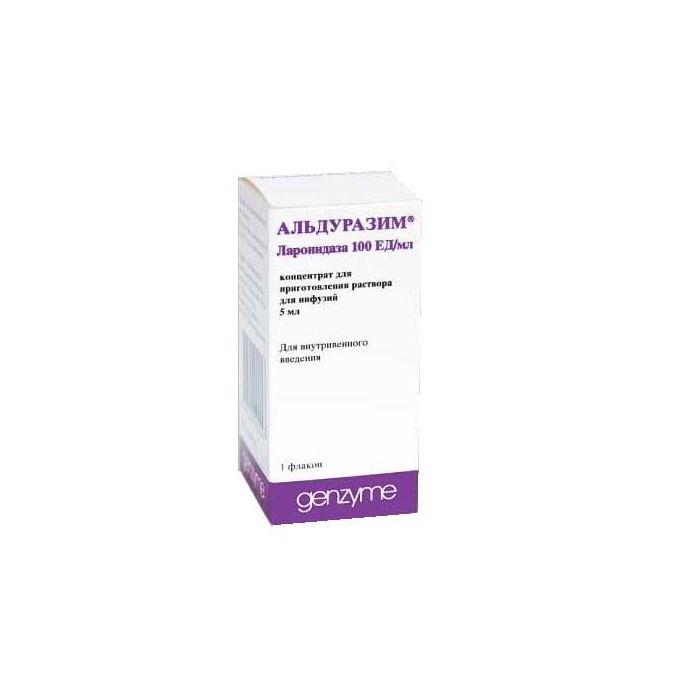Laronydaza | aldurazim bottle 100ED / ml, 5 ml
Special Price
$887.88
Regular Price
$913.00
In stock
SKU
BID468579
Dosage form
Concentrate for solution for infusion
Indications
Long-term enzyme replacement therapy in patients with a confirmed diagnosis of type I mucopolysaccharidosis (MPS-I, alpha-L-iduronidase deficiency) for the treatment of non-neurological manifestations of this disease.
Contraindications
Severe hypersensitivity reactions (such as anaphylactic reactions) to the active substance or any ingredient of the drug (see "Special Instructions" and "Side Effects").
Use during pregnancy and lactation
There are no data on the use of aldurazim in pregnant women. Animal studies have not revealed direct or indirect adverse effects on pregnancy, embryonic / fetal development, childbirth and postnatal development (see. Pharmacodynamics). The potential risk to humans is unknown.
AldurazimВ® should not be used during pregnancy without an obvious need.
Laronidase may be excreted in breast milk. Since there is no data available on newborns receiving laronidase with mother's milk, it is recommended that breast-feeding be discontinued during treatment with aldurazim.
Dosage and Administration
Treatment with aldurazim should be carried out under the supervision of a physician experienced in treating patients with MPS-I or other hereditary metabolic diseases. The introduction of aldurazim should be carried out in an appropriate clinical setting, with the necessary equipment to provide emergency medical care.
Recommended dosage of aldurazim: weekly administration at a dose of 100 IU / kg in the form of / infusion. The initial rate of administration of 2 U / kg / h, with good tolerance, can gradually increase every 15 minutes, up to a maximum of 43 U / kg / h. All the necessary volume of the solution should be introduced within about 3-4 hours. For information on premedication, see the “Special Instructions” section, and for additional instructions, see the section "Instructions for use and handling of the drug."
Safety and efficacy of aldurazim in patients over 65 years of age have not been determined, and therefore recommendations for the dosage regimen cannot be given for patients of this age group.
Safety and efficacy of aldurazim in patients with renal and hepatic insufficiency were not determined, and therefore recommendations on the dosage regimen in such patients cannot be given.
Side effects
The most serious side effects established in clinical and post-marketing research are anaphylactic and allergic reactions.
In clinical trials with the use of laronidase, infections of the upper respiratory tract, rash, and reactions at the injection site were most often observed.
In clinical studies, reactions associated with the administration of the drug were also noted, among which there were most often flushing, fever, rash, needle pain, less often coughing, bronchospasm, shortness of breath, urticaria, angioedema, pruritus.
Post-marketing studies also reported the following common reactions: fever, nausea, vomiting, arthralgia, diarrhea, tachycardia, abdominal pain, increased blood pressure, decreased oxygen saturation.
In most patients receiving laronidase therapy, the appearance of antibodies to laronidase was noted. The clinical significance of this effect is not known.
In placebo-controlled studies, the following effects were noted: upper respiratory tract infections, chest pain, hyperreflexia, paresthesia, skin rash, abscess, bilirubinemia, hypotension, thrombocytopenia, pain and reactions at the injection site, vein complications, congestive edema clouding of the cornea.
Drug Interaction
No interaction studies have been performed with this medicinal product. Based on the metabolism of laronidase, it is an unlikely candidate for interactions, mediated through cytochrome P450.
Aldurasim® should not be given at the same time as chloroquine or procaine, since however, there is a potential risk of impaired intracellular uptake of laronidase.
Incompatibility
Due to the lack of compatibility studies, this product should not be mixed with other drugs, except as indicated in the Package Leaflet and Instructions for Use section.
Storage conditions
At 2-8 РC (in the refrigerator). Diluted solution: From a microbiological point of view, the preparation should be used immediately after preparation. If the preparation was not used immediately after preparation, it may be stored for a maximum of 24 hours at 2–8 РC, provided that the dilution of the preparation was carried out under controlled and validated aseptic conditions.
Shelf life
3 years
dosage form
infusion solution
Possible product names
aldurazim 100ED / ml 5ml
aldurazim conc d / r for infusion 100ED / ml fl 5ml N1
aldurazim vial 100ED / ml, 5 ml
Write Your Own Review

